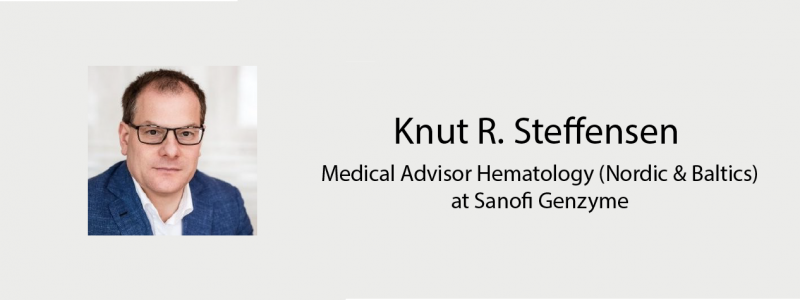
“S.O.S. – Stability Over Status”
Name: Knut R. Steffensen
Did PhD at: University of Oslo & Karolinska Institutet
Current position: Medical Advisor Hematology (Nordic & Baltics) at Sanofi Genzyme
Interviewed by: Mirko E. Minniti
Knut Steffensen left his position as Associate Professor at Karolinska Institutet to work as Medical Advisor in a company. “Although many people think the opposite, after 20 years in academia I’m still connected to it and I think I could still go back, not necessarily in research. There’s need for industrial experience also in academia, and more doors are opened now than before”.
With a PhD thesis on liver X receptor (LXR) and metabolism from the University of Oslo and Karolinska Institutet, Knut was sure about staying in academia. As soon as he could, he applied for a postdoc position and, thanks to a grant from Norway, he continued in the same group at Karolinska Institutet. He then received funding all the way up to associate professor. During these years, his research interests extended to LXR role in inflammation and proliferation. “Having a broad background spanning from metabolism to molecular oncology came very handy afterwards.”
Despite his achievements, he took the initiative to apply for a position outside academia. “I felt it was much more difficult to have life and career stability in university. Also, I was focusing only on administrative stuff while I wanted to expand my knowledge and get a broader perspective on drug development and patient care.” Knut was hired as Medical Advisor for Oncology in Takeda, and then he got a more challenging role for Nordic and Baltics in Hematology at Sanofi Genzyme. “In industry, it’s much easier to find a job, and you have the possibility to change for companies with more drugs early in the pipeline.”
The change was not shocking. “Big companies provide very good training platforms on therapy areas and soft skills.” However, it is a huge advantage to be knowledgeable in the field, either as a medical doctor or researcher, and to be able to interact with all the areas of the company. In fact, his academic background made him a more appealing candidate. “During my PhD, I’ve gained scientific communication skills, a deep science understanding, independency and self-motivation. Along with the experience came the strategic and tactical thinking, and the ability to network. In industry, leadership is more important than in academia, and I’ve learnt how to deal with company-driven issues.”
Knut’s job is diverse, from attending scientific conferences and strategic meetings, to reading scientific articles and discussing therapies with physicians. And one of the reasons he does not regret his choice is the balance of different tasks. “By working in a big pharma and in medical affairs, I’m a link between research/clinical development and regulatory authorities/marketing. I also travel a lot. It’s different from academia: at my current position, there’s a good balance of everything, you need to be in a team and your work as an individual is part of something bigger.”
So, is it better choosing industry? “Research sadly shows that after a postdoc you become too specialized, and you’ll have a lower salary during your whole life. By going straight to the industry after the PhD, you’d start earlier to develop in a different direction. On the other hand, even if you don’t see yourself in academia forever but you’re still interested in research, take a postdoc position. You can go to another lab and another country for 1-3 years, and you’ll learn a lot regardless of publications. A postdoc in a company would be a good compromise.”
Photo: Adapted from LinkedIn profile picture, used with subject’s permission.
This career portrait was originally written for the PhD course “Career skills for scientists”, organized every spring by KI Career Service. As explained in the introduction post, all participants in the course interviewed PhD holders with an academic or a non-academic career. Keep an eye on the tags #careerportrait, #InsideAcademia and #OutsideAcademia listed below, for a selection of these portraits. Get inspired and learn more about your options for your post-PhD career!

0 comments